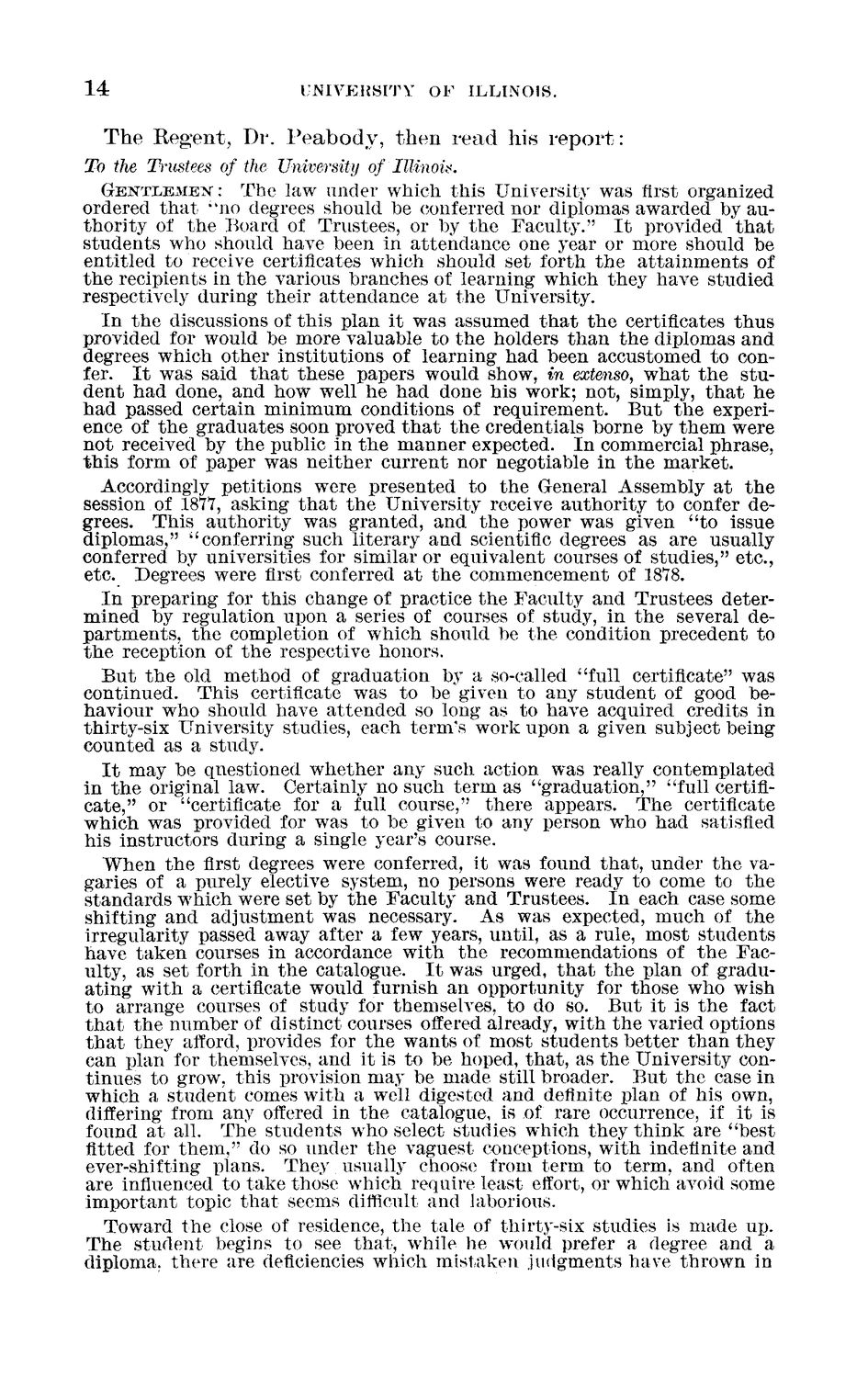| |
| |
Caption: Board of Trustees Minutes - 1890
This is a reduced-resolution page image for fast online browsing.

EXTRACTED TEXT FROM PAGE:
14 UNIVERSITY OF ILLINOIS. The Regent, Dr. Peabody, then read his r e p o r t : To the Trustees of the University of Illinois. GENTLEMEN : The law under which this University was first organized ordered t h a t "no degrees should be conferred nor diplomas awarded by authority of the Board of Trustees, or by the Faculty." I t provided t h a t students who should have been in attendance one year or more should be entitled to receive certificates which should set forth the attainments of the recipients in the various branches of learning which they have studied respectively during their attendance at the University. In the discussions of this plan it was assumed t h a t the certificates thus provided for would be more valuable to the holders than the diplomas and degrees which other institutions of learning had been accustomed to confer. I t was said t h a t these papers would show, in extenso, what the student had done, and how well he had done his work; not, simply, t h a t he had passed certain minimum conditions of requirement. But the experience of the graduates soon proved t h a t the credentials borne by them were not received by the public in the manner expected. In commercial phrase, this form of paper was neither current nor negotiable in the market. Accordingly petitions were presented to the General Assembly a t t h e session of 1S11, asking t h a t the University receive authority to confer degrees. This authority was granted, and the power was given "to issue diplomas," "conferring such literary and scientific degrees as are usually conferred by universities for similar or equivalent courses of studies," etc., etc. Degrees were first conferred at the commencement of 1878. I n preparing for this change of practice the Faculty and Trustees determined by regulation upon a series of courses of study, in the several departments, the completion of which should be the condition precedent to the reception of the respective honors. But the old method of graduation by a so-called "full certificate" was continued. This certificate was to be given to any student of good behaviour who should have attended so long as to have acquired credits in thirty-six University studies, each term's work upon a given subject being counted as a study. I t may be questioned whether any such action was really contemplated in the original law. Certainly no such term as "graduation," "full certificate," or "certificate for a full course," there appears. The certificate which was provided for was to be given to any person who had satisfied his instructors during a single year's course. When the first degrees were conferred, it was found that, under the vagaries of a purely elective system, no persons were ready to come to the standards which were set by the Faculty and Trustees. I n each case some shifting and adjustment was necessary. As was expected, much of the irregularity passed away after a few years, until, as a rule, most students have taken courses in accordance with the recommendations of the Faculty, as set forth in the catalogue. I t was urged, t h a t the plan of graduating with a certificate would furnish an opportunity for those who wish to arrange courses of study for themselves, to do so. But it is the fact t h a t the number of distinct courses offered already, with the varied options t h a t they afford, provides for the wants of most students better than they can plan for themselves, and it is to be hoped, that, as the University continues to grow, this provision may be made still broader. But the case in which a student comes with a well digested and definite plan of his own, differing from any offered in the catalogue, is of rare occurrence, if it is found at all. The students who select studies which they think are "best fitted for them," do so under the vaguest conceptions, with indefinite and ever-shifting plans. They usually choose from term to term, and often are influenced to take those which require least effort, or which avoid some important topic t h a t seems difficult and laborious. Toward the close of residence, the tale of thirty-six studies is made up. The student begins to see that, while he would prefer a degree and a diploma, there are deficiencies which mistaken judgments have thrown in
| |